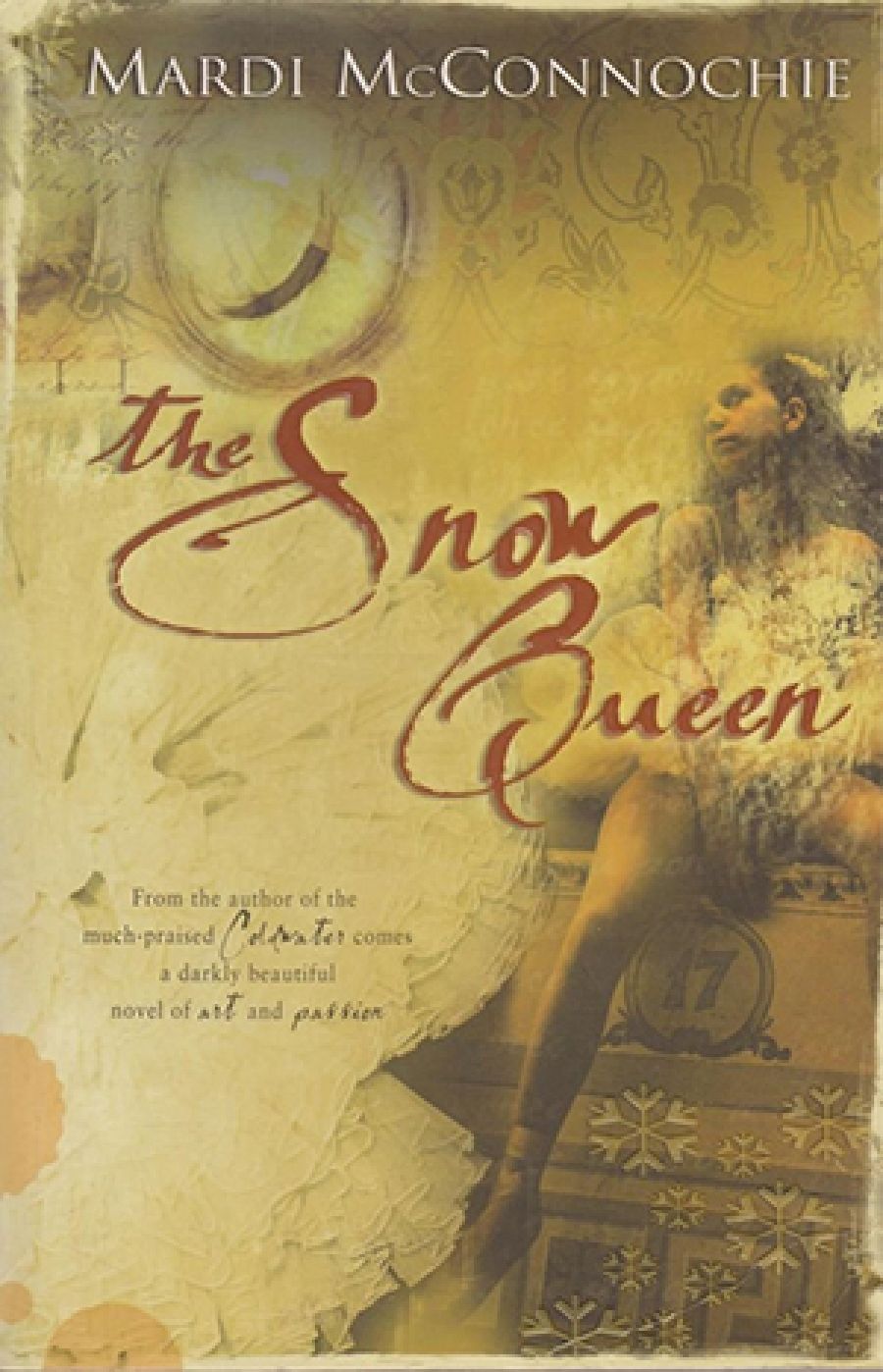
- Free Article: No
- Contents Category: Fiction
- Review Article: Yes
- Online Only: No
- Custom Highlight Text:
When I was about ten, I used to devour the books of an English children’s author named Noel Streatfield. The most famous was called Ballet Shoes, which took young antipodeans onto the stage and into the wings of another world, the London theatre scene. Galina Koslova, a Russian-born émigrée to South Australia and the heroine of The Snow Queen, gives Ballet Shoes to a step-granddaughter, correctly designating it a classic. I wondered whether Mardi McConnochie’s novel was designed to fill the gap left on adult bookshelves by long-abandoned copies of Ballet Shoes, even if our reading requirements have matured.
- Book 1 Title: The Snow Queen
- Book 1 Biblio: Flamingo, $29.95 pb, 245 pp
The story follows Galina’s attempt to found a ballet company in Adelaide, the outbreak of World War I having stranded her touring company in Australia. Teddy, a young gay man, self-indulgent and flashy, presents himself as Galina’s only hope to fill the lead role of Kay opposite her Snow Queen, in a new ballet choreographed by a younger member of the company. Galina’s mariage de convenance to a rich businessman is contracted in counterpoint to the veiled, thwarted feelings, veering between attraction and detestation, that she and Teddy sometimes entertain for each other within the confines of their working partnership.
Whether or not McConnochie was smitten with ballet as a child, she has done her homework. The hardship, discipline and dedication required to become a ballerina form the backbone of the novel, and the technicalities of ballet’s leaps and pirouettes land authentically on the page. The research for the Russian section has resulted in a slightly less accurate picture: Petersburg was not created out of ‘thin air’, but upon the bones of thousands of serf labourers that fell into drained marshland; and Peter’s ‘intentional’ city (as Dostoevsky dubbed it) is more like Canberra than Adelaide; but these quibbles are not the source of my real unease.
Why is it that this easily read book feels so slight, despite competent writing and the neat employment of events that move from St Petersburg to Paris and finally to Adelaide – apart from the fact that its large, open type disguises its brevity? It may be because McConnochie, according to the blurb, ‘works in television as a scriptwriter and editor’. Why The Snow Queen does not satisfy might be sheeted home to the faults of virtues that do not stretch to prose fiction. (Is it in order to persuade us that there is a novelist hunched over her desk that the chapter numbers are written out in copperplate, using the kind of thick nib designed for italic handwriting?) It resembles a ‘treatment’, in which all the potential is laid out but not come to grips with, a sense only strengthened when I searched out some reviews of McConnochie’s first novel, Coldwater (2001), which I haven’t read, and which displaced the three Brontë sisters and their harsh father, all now surnamed Wolf, onto an island penal colony off the coast of Australia. Both these reviews and The Snow Queen have the ring of bright ideas that would make good television screenplays. For the latter, the scenes would be set out as follows: ‘1973 – Teddy (Edward Larwood) arrives back in Adelaide after forty-odd years abroad to direct, by invitation, ‘Ballet South’, a brand new company. Switch to old lady with passionate heart and rich husband (the older Galina), who bitterly resents this development and makes her feelings plain at a dinner party for twelve, reviling Larwood over the fondue. Galina decides to write a memoir: flashback to the Imperial Ballet School etc.’ Very picturesque.
But what happened to the editing in the paragraph where Galina falls through the ice while skating? ‘There was no one near me, no one had seen me fall.’ A few lines later, we learn: ‘Someone had seen me go through …’ A dramatic, if contradictory, rescue can take place. Flash forward and change scene to Teddy and his stereotypically conventional sister’s Christmas dinner. Flashback to Galina’s defection to the Paris Opera in 1918. You get the picture. Or rather, you don’t, because what you actually get is the novel, much of it told through Galina’s memoir, in which McConnochie faithfully reproduces the stilted English of a non-native speaker. Moreover, because of her austere view of what is proper, Galina does not tell the whole story; the memoir omits the real issue – the secret springs of what she felt for Teddy, and he for her. These feelings never quite mirrored each other, as we ultimately find out (and I don’t want to give away the whole story), but somewhere along the line an opportunity seems to have been missed. Can you write a novel based on a book-within-a-book, when the former leaves out, for reasons of character, the truly gripping bits? It seems to result in little dramatic tension and a great deal of recounting, interspersed towards the end with dribbles of explanation.
I am sure there will be an audience for The Snow Queen – particularly balletomanes and Adelaideans – and the romantic cover will enhance the bookstands. But it will not advance the cause of the Australian novel.


Comments powered by CComment